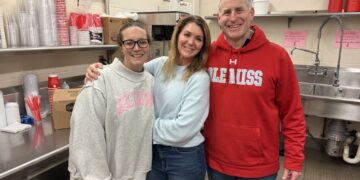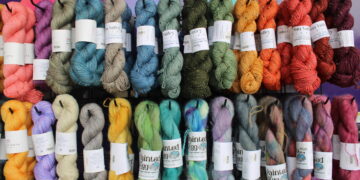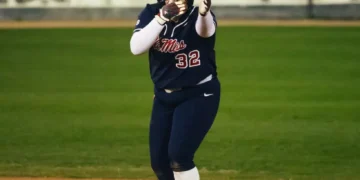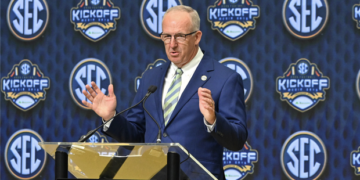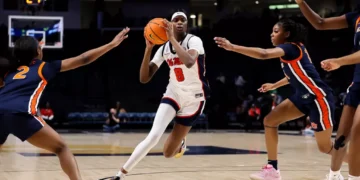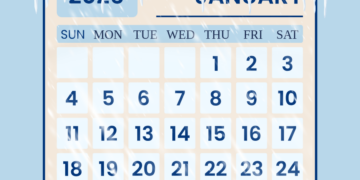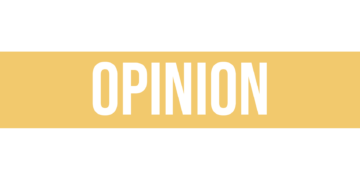
Social media platforms such as X, TikTok, Facebook and Instagram have redefined the spread of political information and changed how politicians engage with voters — something that students at the University of Mississippi have mixed opinions about in the 2024 election cycle.
President Donald Trump used X extensively during the 2016 U.S. presidential election. He now communicates with potential voters through platforms like TikTok, where he has amassed 12.4 million followers, and Truth Social, where he has 7.96 million followers.
Similarly, 2024 Democratic presidential nominee Kamala Harris has used TikTok to reach younger voters. Her campaign page, @kamalahq, has kickstarted and benefited from many viral trends, amassing 4.6 million followers.
Samantha Case, a senior history major from Madison, Miss., appreciated the social media activity of some of the candidates.
“I’ve found that I’ve been keeping up with the upcoming election through social media, including following the candidates on Instagram, except for former President Trump. …The candidates that I’ve been following have had strong social media presences. Kamala Harris especially is using her social media platforms to engage with younger voters such as myself,” Case said. “Her team has been playing into the various pop culture references and memes about her, such as the ‘Kamala is brat’ tweet by Charli XCX and the ‘coconut tree’ line from a Harris speech.”
Other students have a more negative view of the political content they see online.
Sophomore English major from Birmingham, Ala., Quade Beasley said that although he does not engage with political social media content, it continues to show up on his feed.
“It just keeps showing up, and I don’t know why,” Beasley said. “My opinions of social media during the election are mostly negative, just because I don’t really care to be reminded of it. Because most of those posts, to me, just seem like they’re trying to grab my attention, in my view, rather than my genuine opinion on the elections.”
Maci Wadlington, a senior theater major from Mendenhall, Miss., believes that the focus on social media takes away from conversations about policy.
“I’ve seen many videos on TikTok where the social media managers for both campaigns will post a video to a trending sound to try and relate to a younger audience,” Wadlington said. “Presidential elections have always had an element of a popularity contest, but this is taking it over the line. I feel like candidates are more worried about their social media presence than communicating with voters about their platforms.”
Connor Bradley, a first-year law student from Oxford, said that while direct communication allows for a more personal connection with voters, it is primarily a marketing tool.
“The candidates have an agenda, and they are trying to market themselves to you like any other product you might buy,” Bradley said.
Shea Graham, a junior psychology and philosophy double major, agreed with Bradley.
“I think there is a fine line between political advertising and propaganda,” Graham said.
Kylia McKoy, a senior journalism and biological sciences major from Houston, said she was concerned about the spread of misinformation.
“They are appealing to a younger crowd by utilizing the apps they market themselves on, but they are spouting complete nonsense, and most of the younger generation believes it is real because they get all of their news from social media,” McKoy said. “I think a lot of misinformation gets spread on social media, and the younger generation takes it in as fact, further building a mindset off of something that isn’t real or will not be happening.”
Graham said that she takes steps to counterbalance the amount of political content on her feed.
“I see more left-leaning marketing because I lean more left,” Graham said. “If I see a political advertisement on social media, I instantly dislike it to fix my algorithm. I hate being marketed (to).”
Case said that she tries to supplement what she sees on social media with outside research.
“I think social media can be used as an effective tool in informing voters regarding issues related to the upcoming election, but it shouldn’t be used by itself,” Case said. “I believe it is up to the voter to do their own research outside of social media and make an informed decision regarding how they will vote in November.”
Graham gave a piece of advice to all voters who have encountered political content this year.
“(Social media) is part of the future for better or worse,” Graham said. “(Do) not have an opinion on something unless you’re educated on it.”







